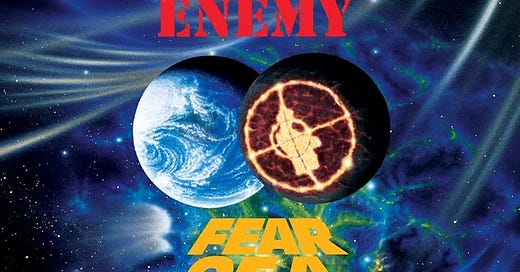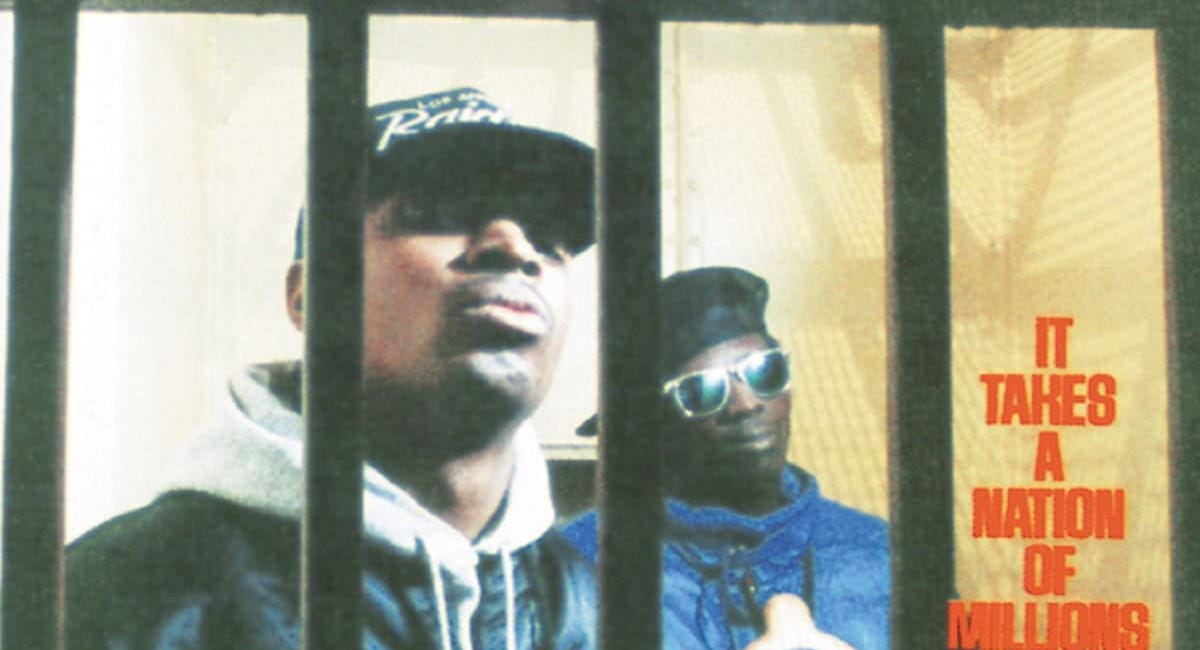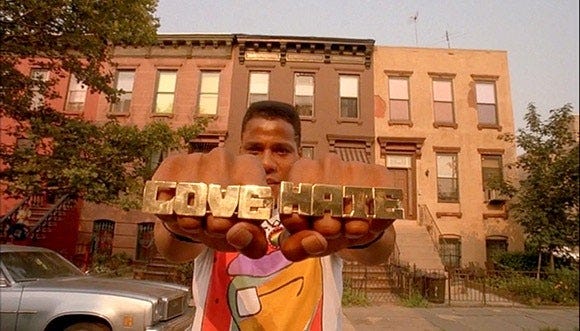Most of my heroes don't appear on no stamps
Public Enemy - 'Fight The Power' (Fear of A Black Planet - 1990)
Usually, on The Run Out Grooves, we try to isolate a song and discuss it in the context of the album it finishes and the career arc of the artist in question. We try to ignore whether it was a single or featured in a movie, but in this case, it is simply not possible.
Public Enemy’s ‘Fight the Power’ is the closing track of 1990’s Fear of a Black Planet, but it was an incendiary statement on wax and celluloid that has gone on to help define an era for hip-hop. Released as a single in 1989, the song was initially conceived as the thematic backbone for Spike Lee’s seminal film Do the Right Thing. As the final track on Fear of a Black Planet, it serves as both a climax and a rallying cry, encapsulating the anger, frustration, and defiance that permeate the entire album. This track marked an evolution from their previous work on It Takes A Nation of Millions To Hold Us Back by blending dense layers of samples, politically charged lyrics, and an aggressive sound.
Power and equality and I'm out to get it
In July 1989, Public Enemy head honcho Chuck D said in an interview with the Indiana Black Expo that youths idolise rappers because they tell it like it is.
Spike Lee’s Do the Right Thing is a film about racial tensions in a Brooklyn neighbourhood, and Lee knew he needed a song that would serve as the movie’s heartbeat. He approached Public Enemy at the height of their powers following the release of It Takes a Nation of Millions to Hold Us Back. Chuck D took inspiration from The Isley Brothers' 1975 song of the same name, infusing it with a modern perspective on the socio-political climate of the late 1980s. The song’s repeated refrain, "Fight the power," became a rallying cry within the film but also in the real world, where it was embraced as an anthem of resistance and is maybe the most famous quote from any hip-hop song.
In Do the Right Thing, ‘Fight the Power’ is not an example of non-diegetic sound—it is diegetic, as it blares from Radio Raheem’s boombox throughout the film as a frequent nod to the need and desire for justice. The track’s aggressive, in-your-face energy and confrontational lyrics mirror the rising tensions in the film, culminating in a powerful scene that encapsulates the racial strife of the time. The song’s presence in the movie alone would have solidified its status as a cultural touchstone, resonating with audiences far beyond the confines of the cinema.
‘Fight the Power’ is masterfully produced, thanks to the innovative work of The Bomb Squad, Public Enemy’s production team. Known for their dense, layered approach to sound, The Bomb Squad used an array of samples to create a bold sonic landscape that was both chaotic and controlled. The track opens with a sample of civil rights activist Thomas ‘TNT’ Todd, setting the stage for the revolutionary rhetoric that follows. The song is built on a foundation of funk and soul, with samples from James Brown’s ‘Funky Drummer’, Sly and the Family Stone’s ‘Sing a Simple Song’, and the Isley Brothers’ original ‘Fight the Power’.
The use of these samples was not just a nod to their musical forebears but a deliberate choice to recontextualise African-American music in a way that was both reverent and revolutionary. The Bomb Squad precisely layered these samples, creating a jarringly new sound from the familiar. This production style was unlike anything that had come before, and it set a new standard for hip-hop, one that prioritised message and mood over melody and harmony.
Chuck D’s lyrics in ‘Fight the Power’ are unapologetically confrontational. From the opening line, "1989!", it’s clear that this song is meant to challenge the status quo. Chuck D addresses the African-American community directly, urging them to "fight the powers that be" and take pride in their identity. The song’s third verse famously aims at (white) American cultural icons, Elvis Presley and John Wayne, calling out their symbolic representation of a whitewashed American history that ignored the contributions and struggles of Black Americans.
This directness in not only addressing systemic racism and cultural appropriation but doing so in such a blunt and confrontational manner was ground-breaking and remains influential today. Chuck D’s delivery is passionate and measured, lending the song an air of authority that must be taken seriously. The lyrics are not just a call to action but a critique of a society that has long ignored the voices of its Black citizens.
Ending Fear of a Black Planet with ‘Fight the Power’ is bold. The album is a complex exploration of race, identity, and power, and ‘Fight the Power’ encapsulates these themes in its most distilled form. The linear passage of time would suggest it should open the album as a lead single or be placed last on an album that preceded Fear of a Black Planet. By placing it at the end, Public Enemy ensure that the message lingers long after the music stops. The track doesn’t offer resolution but insists on continued resistance, making it the perfect closing statement for an album that seeks to provoke thought and action. Why place your call to arms first and follow it with another 58 minutes of other material?
‘Fight the Power’ has endured as one of the most essential songs in hip-hop history. Its use in Do the Right Thing immortalised it as a symbol of resistance against racial injustice, and its placement on Fear of a Black Planet solidified Public Enemy’s status as one of the most politically potent groups of their time. It is a top-of-the-hour bulletin from “Black CNN” that can’t be ignored.







I never got the sense that "Fight The Power" ended FOABP so much as it was tacked on because people desired the single. Its real home is on the Do The Right Thing soundtrack.
Well, done. Mitchell. As I don't own 'Do the Right Thing', "Fight the Power" has always been the end of 'Fear of a Black Planet' for me, but really, it became its own thing, bigger than any soundtrack or particular album. I was probably at my peak hip-hop awareness and appreciation in late 80s-early 90s, and it was one of those sonic blasts that sounded like little else at the time. It's a more than worthy successor to the Isleys' song. Since I am basically Chuck D.'s age, the original FtP was something I also heard in real time, and transcended my white teenage suburban world. Loved it then, love it now. When I saw this post, I immediately remembered this NPR clip from a while ago with Ernie Isley and Chuck D. talking about their "Fight the Power"s. https://www.youtube.com/watch?v=bScwXhbY5VM